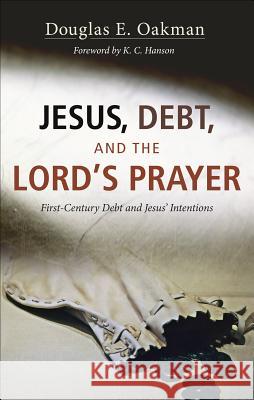Jesus, Debt, and the Lord's Prayer: First-Century Debt and Jesus' Intentions » książka
Jesus, Debt, and the Lord's Prayer: First-Century Debt and Jesus' Intentions
ISBN-13: 9781625647931 / Angielski / Miękka / 2014 / 166 str.
Jesus, Debt, and the Lord's Prayer: First-Century Debt and Jesus' Intentions
ISBN-13: 9781625647931 / Angielski / Miękka / 2014 / 166 str.
(netto: 84,41 VAT: 5%)
Najniższa cena z 30 dni: 87,66
ok. 16-18 dni roboczych.
Darmowa dostawa!
Deeply rooted in the story of Jesus of Nazareth is a concern for people mired in debt. Debt was a central control mechanism for the administration of the Roman Empire. Client states such as those of the Herods in Palestine were entrusted with maintenance of the established order, the Pax Romana, and their patronage entailed legions of the indebted. Debt kept peasants at their plows and contributed to the suffering bodies and tortured minds that Jesus attempted to heal. His parables and central prayer feature the forgiveness of money debts. In the end, his praxis to liberate people from perennial debt led to a Roman cross, but his memory was kept alive at the table around which he communed with tax collectors and debtors alike. ""Douglas Oakman brings a most welcome scholarly and prophetic voice to this sustained analysis of Jesus's political goals. He invites us to suspend our social or religious notions and follow him through some complex literary and historical matters. We enter a fruitful, open conversation on the nature of Jesus's radical belief in divine forgiveness and the kingdom of God, and we begin to understand the development of his messiahship and divinity in entirely new ways."" --Gildas Hamel, University of California, Santa Cruz, CA ""In Oakman's perceptive and rewarding political and socioeconomic analysis, written with sincere personal conviction, the 'preferential option for the poor' in modern theology receives a distinctive historical Jesus confirmation."" --Dennis C. Duling, Canisius College, Buffalo, NY ""While the Lord's Prayer is foundational for Christian belief and identity, no other scholar has done more in recent decades than Douglas Oakman to explore its original meaning in the context of Jesus's life and ministry. With Oakman's incisive and wide-ranging understanding of the first-century Palestinian world, that meaning comes to life in this volume as the inspiring and hope-filled expression of someone deeply and compassionately invested in the plight of the poor. . . . Oakman brings the Lord's Prayer to life for our world."" --Philip F. Esler, University of Gloucestershire, Cheltenham, Gloucestershire UK Douglas E. Oakman is Professor of Religion at Pacific Lutheran University in Tacoma, WA. He is the author of Jesus and the Economic Questions of His Day (1986) and, with K. C. Hanson, co-author of the award-winning Palestine in the Time of Jesus (2008), Jesus and the Peasants (2008) and The Political Aims of Jesus (2012).
Deeply rooted in the story of Jesus of Nazareth is a concern for people mired in debt. Debt was a central control mechanism for the administration of the Roman Empire. Client states such as those of the Herods in Palestine were entrusted with maintenance of the established order, the Pax Romana, and their patronage entailed legions of the indebted. Debt kept peasants at their plows and contributed to the suffering bodies and tortured minds that Jesus attempted to heal. His parables and central prayer feature the forgiveness of money debts. In the end, his praxis to liberate people from perennial debt led to a Roman cross, but his memory was kept alive at the table around which he communed with tax collectors and debtors alike.""Douglas Oakman brings a most welcome scholarly and prophetic voice to this sustained analysis of Jesuss political goals. He invites us to suspend our social or religious notions and follow him through some complex literary and historical matters. We enter a fruitful, open conversation on the nature of Jesuss radical belief in divine forgiveness and the kingdom of God, and we begin to understand the development of his messiahship and divinity in entirely new ways.""--Gildas Hamel, University of California, Santa Cruz, CA""In Oakmans perceptive and rewarding political and socioeconomic analysis, written with sincere personal conviction, the preferential option for the poor in modern theology receives a distinctive historical Jesus confirmation.""--Dennis C. Duling, Canisius College, Buffalo, NY""While the Lords Prayer is foundational for Christian belief and identity, no other scholar has done more in recent decades than Douglas Oakman to explore its original meaning in the context of Jesuss life and ministry. With Oakmans incisive and wide-ranging understanding of the first-century Palestinian world, that meaning comes to life in this volume as the inspiring and hope-filled expression of someone deeply and compassionately invested in the plight of the poor. . . . Oakman brings the Lords Prayer to life for our world.""--Philip F. Esler, University of Gloucestershire, Cheltenham, Gloucestershire UKDouglas E. Oakman is Professor of Religion at Pacific Lutheran University in Tacoma, WA. He is the author of Jesus and the Economic Questions of His Day (1986) and, with K. C. Hanson, co-author of the award-winning Palestine in the Time of Jesus (2008), Jesus and the Peasants (2008) and The Political Aims of Jesus (2012).











